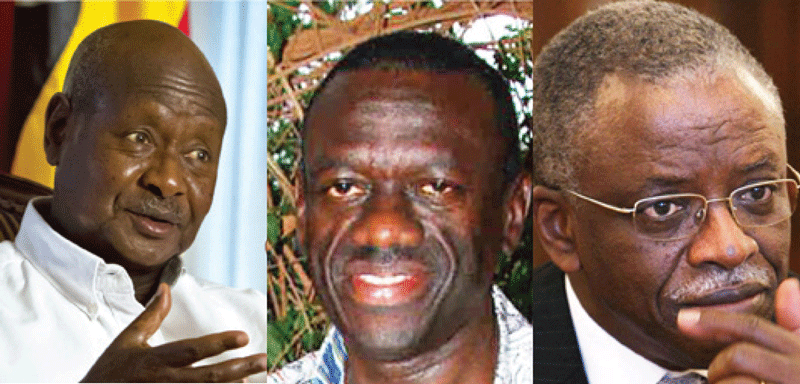Columnists
You want my vote, are you trustable?
Ugandans are in such a moment in time when “trust” is more precious than gold. Politicians are all over the place looking for people they can talk to so that they can either retain power or win it for the next five years. Whom do you trust?
Some of them have been talking to us countless times in the past twenty years or so. They have made promises before. They fulfilled some, and also failed on others. They have reasons why they failed on some of the promises they made. The reasons may be genuine; man was made to succeed in some endeavours and fail in others. But should we trust, just like that, that this time round the incumbents will fulfill their promises?
What about the newcomers? Why should we trust what they are telling us? What framework should we use to assess their level of trustworthiness? Fine, they have identified for us what doesn’t work in our communities, and they are proposing ways they will fix them. But why should we trust them? Especially when the very people we want to vote out also promised us the very things their opponents are promising?
Someone may be wondering; “what is this guy up to?” Well, the spirit of this week’s piece is to provide you with some facts about the economics of trust, and as well cite for you some empirical evidence on how trust and election work in the real world.
Trust is one variable that is difficult to measure scientifically. There are several agencies that are trying to measure it, but many researchers have always picked interest in the “Lost Wallet Test”, annually conducted by The Reader’s Digest, an online magazine.
The lost wallet test is a social experiment designed to measure honesty of people in different countries. They “accidentally” drop wallets, each containing about $50 worth of cash. In each wallet, they put a name with a cellphone number, a family photo, coupons, and business cards.
They drop the wallets in a score of cities, small towns and suburbs of cities across the world.
Then they watch to see what would happen.
In their latest study, they “dropped” 12 wallets in each of the 16 cities they selected. Results were soon out: the most honest city was Helsinki, Finland. Out of the 12 wallets dropped there, 11 were returned with the money intact. Perhaps there is a Ugandan sweeping there who stole the sole wallet that was not returned.
In Mumbai, India, 9 wallets were returned, while in London, England, only 5 were returned. In Rio de Janeiro, Brazil, 4 wallets were returned while in Madrid, Spain, only 2 were returned. In Lisbon, Portugal, the single wallet that was returned had been picked by a couple in their sixties but interestingly the two were not from Lisbon. They were visiting from Holland.
Where the finders returned the wallets, they did so either directly to their owners or through an official intermediary — a policeman, hotel receptionist, or such. Think about what might even happen to the wallets handed to our police or receptionist!
The researchers found that by and large comparative wealth seemed no guarantee of honesty, neither age nor gender. Not even religion would help. There are simply honest and dishonest people everywhere. Therefore, we cannot trust people simply because they claim to be religious or old.
But earlier surveys had found that Scandinavians were more likely to return lost wallets, than anyone else in the world. Africans were least likely. I often tell my students that although Kampala has never been put in such a survey, I can comfortably guess the results. Not even a wallet will be returned with the money intact.
Why? It doesn’t need God to know what will happen to wallets with $50 dropped in a city where those who often steal people’s wallets do not wait for them to drop them; they pick them from their pockets. Is it because of our DNA or being ungodly?
Economists have something they call the “Principal-Agent Problem”. It arises when the agent (someone you entrust to do something for you) has objectives different from those of the principal (the one who is delegating), and the principal either has difficulty to enforce the contract with the agent or finds it difficult and costly to monitor the agent to verify that he/she is furthering the principal’s objectives. In other words, the principal-agent problem raises the transaction costs of managing contracts.
When trust is high, transaction costs reduce. With trust, contracts (such as the one voters and the candidates are negotiating right now) can be enforced without costly monitoring and investigation of performance by the contractual parties.
Trust is the belief or perception by one party (e.g. a voter, in this case the “principal”) that the other party (e.g. a candidate, the “agent”) to a particular transaction (e.g. an election promise) will not cheat, where the payoff structure internal to the transaction can be characterised by a principal-agent game.
Back in the 1970s, Kenneth Arrow wrote, “Virtually every transaction has within itself an element of trust, certainly any transaction conducted over a period of time. It can be plausibly argued that much of the economic backwardness in the world can be explained by the lack of mutual confidence.”
Economics teaches us that in absence of trust among the “economic agents”, potential benefits can easily be foregone. For example, goods and services cannot be provided in exchange for a promise of a future payment; sellers demand for cash.
I have heard many candidates complaining that Ugandan voters are demand for money and other goodies to support the candidates. Well, this could be a sign that they no longer trust the politicians. They know that after the election, the winners will not return their bargain. So, now it is “instant payment”.
In financial sector, without trust creditors are willing to loan money only to debtors who possess collateral, and even then, they charge very high interest rates. Reason? They know that if you lend ten Ugandans, on average six will repay and the rest will default. The six should thus pay on behalf of the four that are likely to default.
Without trust, voters stop to rely on the politicians’ promise that they will deliver on their campaign promises and also continue to behave the way they behave during campaigns. I really enjoy the way Rt. Hon. Amama Mbabazi is behaving these days; carrying bottles of water for journalists, eating yellow banana in the middle of the road, hugging less groomed folks etc.
What should I say about Col. Besigye? He has always been in a pro-poor posture since he arrived on the political scene in 2001. Unfortunately, he has not been in power when I was conscious enough to watch how he would behave.
Like many other societies, the levels of trust among Ugandans are very low. This is mainly on the account that all the three sources of trust — first-party, second-party, and third-party enforcement mechanisms — are either weak or missing in Uganda. The ethical or moral codes that impose “internal sanctions,” such as guilt, on cheaters are weak.
Most importantly, the social institutions, private organisations, and government institutions which would enforce sanctions such as laws, rules and regulations that reduce incentives to cheat, are very weak. Actually such institutions such as courts, police etc, are themselves not trusted.
Empirical evidence shows that public trust in politicians in Uganda is low, ranking 94th in the world out of 144, according to the 2015 Global Competitiveness Report. That is why many rational citizens in this country decline to vote, to attend protest rallies, or even to acquire information about the electoral process.
Researchers have actually found that a culture of trust is necessary for governments to be willing to surrender power to the opposition. This simple to understand why: often the goal of one group is to reduce the well-being of members of some other group. Successful collective action in the first group entails welfare losses for members of the second group.
So the only way those in power can feel comfortable to surrender to the winners is when they trust that their own welfare will not reduce beyond loss of power (e.g. by finding themselves in jail).
This is where the opposition group needs to be very careful not to threaten so much the group in power. They will not lie on their backs for you to come and crush them.
Comments














